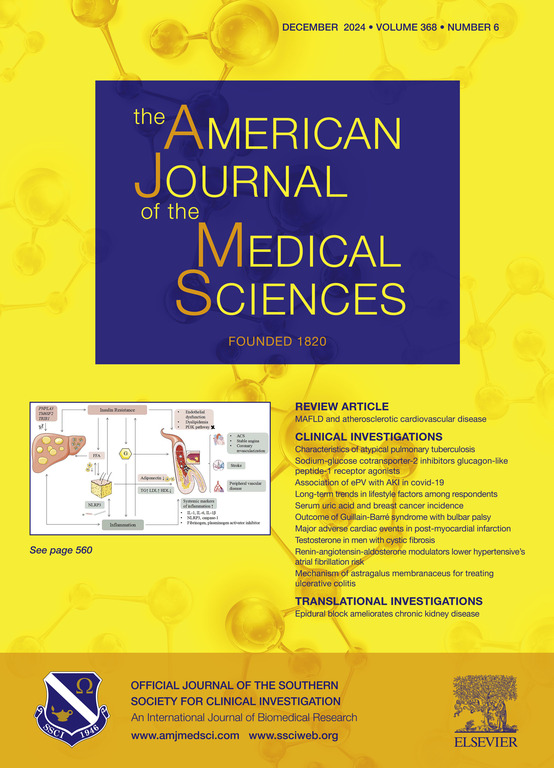FOXO4 通过抑制自噬抑制三阴性乳腺癌的顺铂耐药性
IF 2.3
4区 医学
Q2 MEDICINE, GENERAL & INTERNAL
引用次数: 0
摘要
背景:对顺铂(DDP)化疗的耐药性是治疗三阴性乳腺癌(TNBC)的主要挑战。DDP耐药细胞中叉头盒O4(FOXO4)经常下调。然而,FOXO4的下调是否与DDP耐药有关尚不清楚。在此,我们研究了FOXO4与TNBC的DDP耐药性之间的关系:方法:我们通过体外筛选建立了 DDP 耐药细胞系 MDA-MB-231/DDP 和 BT-549/DDP。CCK-8和集落形成试验分析了细胞的生长情况。计算抗性指数。评估细胞自噬。Western 印迹和 qRT-PCR 检测蛋白质和基因的表达。双荧光素酶报告实验测定了 FOXO4 与 TGF-β1 之间的结合:结果:FOXO4在MDA-MB-231/DDP和BT-549/DDP细胞中的表达量明显较低。FOXO4的过表达增加了TNBC细胞对DDP的敏感性。对DDP耐药的细胞中PI3K Ⅲ类和Beclin-1水平以及LC3-II/LC3-I比值明显升高。此外,DDP耐药细胞的自噬通量也有所增加。3-MA 通过抑制自噬增强了 TNBC 细胞对 DDP 的敏感性。FOXO4 的过表达、3-MA 的处理以及三者的结合能显著降低耐药指数。FOXO4 直接靶向 TGF-β1。此外,敲除 TGF-β1 可抑制自噬,恢复 DDP 耐药细胞对 DDP 的敏感性。从机制上讲,FOXO4通过调节自噬和TGF-β1影响了TNBC对DDP的耐药性:结论:FOXO4过表达与自噬抑制剂联合使用,可显著改善TNBC耐药细胞对DDP的敏感性。这些发现揭示了FOXO4在DDP敏感性中的作用和机制,可能为开发TNBC疗法提供证据。本文章由计算机程序翻译,如有差异,请以英文原文为准。
FOXO4 suppresses cisplatin resistance of triple-negative breast cancer by inhibiting autophagy
Background
Resistance to chemotherapy containing cisplatin (DDP) is a main challenge in the treatment of triple-negative breast cancer (TNBC). Forkhead box O4 (FOXO4) is frequently downregulated in DDP-resistant cells. However, it is unclear whether FOXO4 down-regulation is related to DDP resistance. Here, we investigated the relationship between FOXO4 and DDP resistance in TNBC.
Methods
We established the DDP-resistant cell lines MDA-MB-231/DDP and BT-549/DDP through in vitro selection. CCK-8 and colony formation assays analyzed cell growth. The resistance index was calculated. Cell autophagy was evaluated. Western blotting and qRT-PCR measured protein and gene expression. The binding between FOXO4 and TGF-β1 was determined by the dual-luciferase reporter assay.
Results
FOXO4 expression was significantly lower in MDA-MB-231/DDP and BT-549/DDP cells. FOXO4 overexpression increased the sensitivity of TNBC cells to DDP. The PI3K class Ⅲ and Beclin-1 levels and LC3-II/LC3-I ratio elevated significantly in DDP-resistant cells. Moreover, the autophagic flux was enhanced in DDP-resistant cells. 3-MA enhanced the sensitivity of TNBC cells to DDP by inhibiting autophagy. Overexpression of FOXO4, treatment with 3-MA, and their combination significantly reduced the drug resistance index. FOXO4 directly targeted TGF-β1. Additionally, TGF-β1 knockdown inhibited autophagy and restored the sensitivity of DDP-resistant cells to DDP. Mechanistically, FOXO4 affected TNBC resistance to DDP by regulating autophagy and TGF-β1.
Conclusion
FOXO4 overexpression, in combination with autophagy inhibitors, can significantly improve the sensitivity of TNBC-resistant cells to DDP. These findings reveal the role and mechanism of FOXO4 in DDP sensitivity and may provide evidence for the development of TNBC therapies.
求助全文
通过发布文献求助,成功后即可免费获取论文全文。
去求助
来源期刊
CiteScore
4.40
自引率
0.00%
发文量
303
审稿时长
1.5 months
期刊介绍:
The American Journal of The Medical Sciences (AJMS), founded in 1820, is the 2nd oldest medical journal in the United States. The AJMS is the official journal of the Southern Society for Clinical Investigation (SSCI). The SSCI is dedicated to the advancement of medical research and the exchange of knowledge, information and ideas. Its members are committed to mentoring future generations of medical investigators and promoting careers in academic medicine. The AJMS publishes, on a monthly basis, peer-reviewed articles in the field of internal medicine and its subspecialties, which include:
Original clinical and basic science investigations
Review articles
Online Images in the Medical Sciences
Special Features Include:
Patient-Centered Focused Reviews
History of Medicine
The Science of Medical Education.

 求助内容:
求助内容: 应助结果提醒方式:
应助结果提醒方式:


